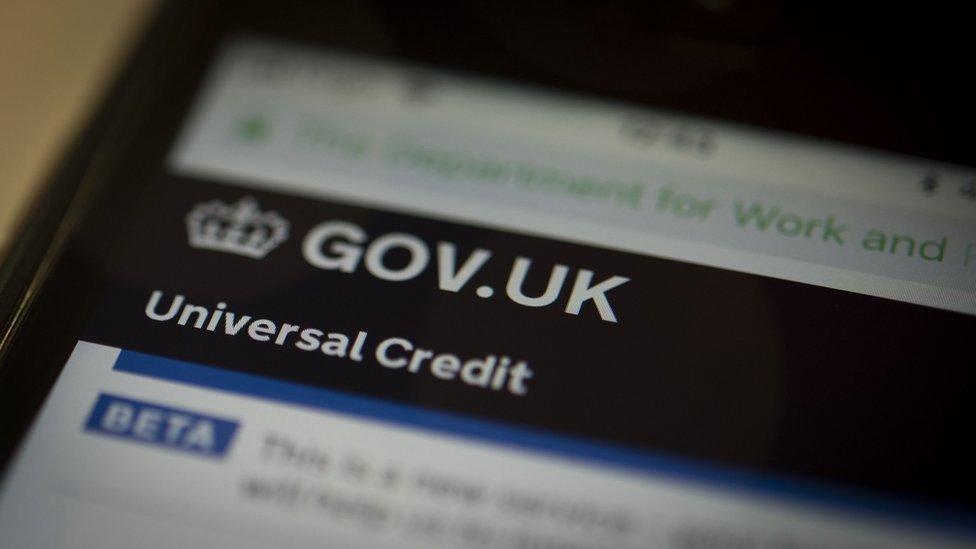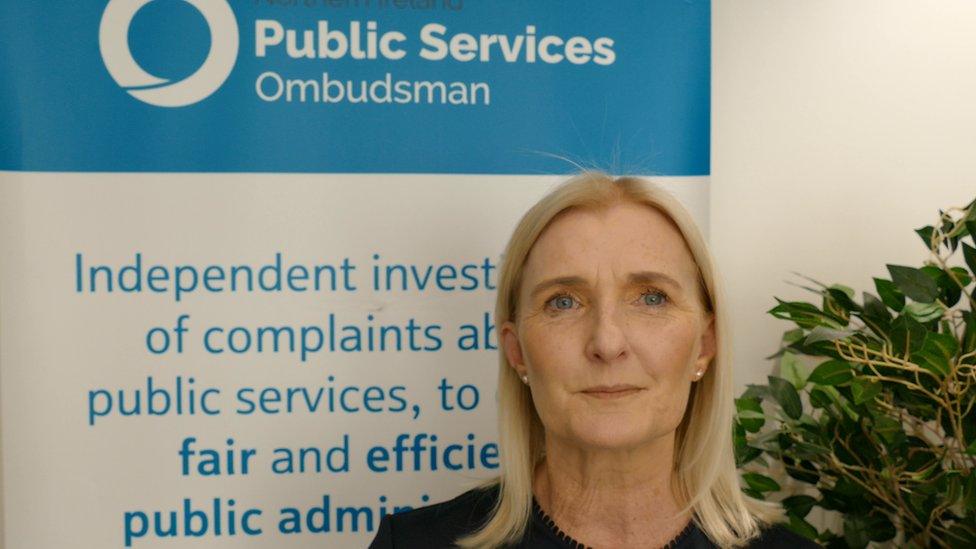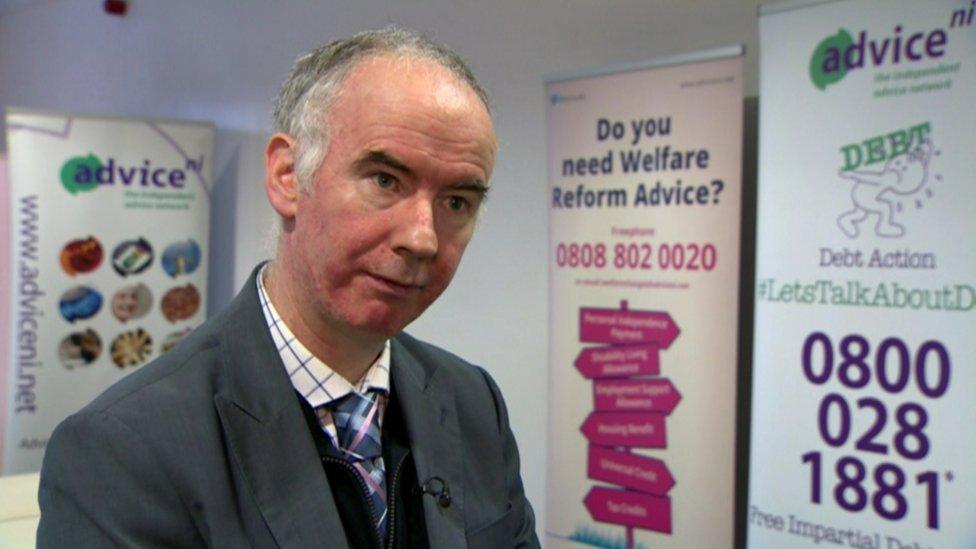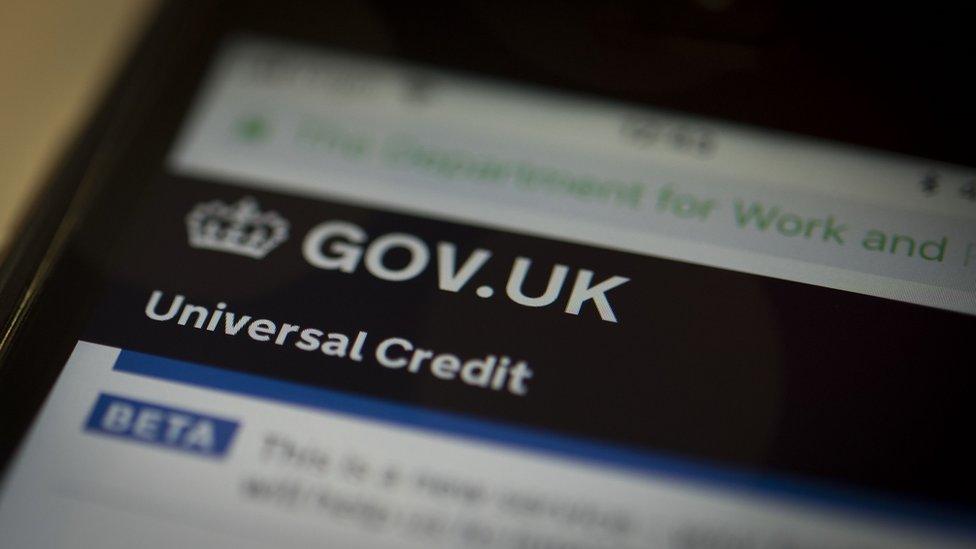Universal Credit: Taxi driver refunded £11k after complaint
- Published

The taxi driver was advised to apply for Universal Credit when temporarily out of work
A Stormont department has repaid more than £11,000 to a taxi driver after he successfully complained that he lost out on benefits due to poor advice.
He was temporarily unable to work after a car crash so he phoned a government support centre to claim benefits.
He was advised to apply for Universal Credit, but was not warned of the risk he could lose £54 a week in tax credit.
The Northern Ireland Public Services Ombudsman upheld his complaint and said it amounted to "maladministration".
Margaret Kelly said the taxi driver suffered "injustice" because he had been denied the opportunity of making "a fully informed decision" about how his Universal Credit (UC) application would affect his existing benefits, in this instance his working tax credit.
Welfare campaigners said the case highlights how some people risk losing their entitlement to their existing social-security benefits when they apply for UC, even if their UC application is turned down.
Deleted recording
In his complaint, the taxi driver told the ombudsman that he applied for UC within an hour of his phone call with the Department for Communities' Employment Support Centre. His application was turned down.
He said he later found out that by applying for UC, he had effectively ended his right to claim working tax credit ever again and there was "no right of appeal".
The taxi driver said his working tax credit had amounted to £216 over each four-week period and losing this money left him in financial hardship.
The ombudsman's investigation concluded that the complainant had "a reasonable expectation that he would not be left worse off by following the advice given by the department's adviser".
She added that the adviser did not "raise any flag, even of a general nature, that making a claim for UC may affect existing benefits".

Margaret Kelly said the taxi driver "suffered a huge amount of stress and financial hardship through no fault of his own"
A recording of the taxi driver's call was deleted by the department before it could be heard by the ombudsman.
But Ms Kelly said on the balance of the available information, she found no evidence that the adviser had told the man about the availability of independent telephone advice or online benefits guidance.
"I am satisfied that had the complainant been fully informed, he would not have claimed UC and would not have lost out financially," she said.
Ms Kelly recommended that the department repay all the money the taxi driver lost out on from the time he applied for UC in April 2018 through to the date of her report - a total of £11,412.
She also said the complainant should get a written apology from the department's permanent secretary "for the injustice caused as a result of the maladministration".
She added the department should also apologise for prematurely deleting a recording of his telephone conversation with a call handler before his complaint was investigated.
The Department for Communities said it "acknowledges the findings of NIPSO in respect of this complaint".
"An action plan addressing all of the recommendations was immediately developed following receipt of the draft investigation report earlier this year and the ombudsman has been advised that all recommendations have been implemented," its spokeswoman added.
UC rolls several existing social welfare benefits into one fortnightly or monthly payment, depending on a claimant's eligibility for each benefit.
These include payments like housing benefit; jobseeker's allowance; child tax credit and working tax credits.
The process of moving claimants from these older "legacy benefits" has taken several years and is far from complete.
In June 2022, the charity Advice NI said more than 250,000 claims for legacy benefits were still active in Northern Ireland, external.
It warned it would be an "incredibly complex" process to move them all to UC by the target date of December 2024.
Advice NI's head of policy, Kevin Higgins, said he hoped the investigation would raise awareness about the financial risks of transferring from older, non-means-tested benefits to UC.

Kevin Higgins said benefits claimants need to seek independent advice before they transfer to UC
"Once you leave your legacy [benefit] and claim Universal Credit there's no going back, so it's very important that you're clear on what you are doing and why you're doing it," he told BBC News NI.
"Some people will be worse off; some people might be better off; some people are roughly the same."
Mr Higgins explained that personal savings can be taken into account in a UC application, preventing a new claim and invalidating existing claims in certain circumstances.
"People shouldn't shouldn't take a risk on this. They should get independent advice, and they should be very clear before they do anything," he said.
"Don't gamble on UC. Stay put if you're worried about anything."
Speaking about the 250,000 existing legacy claims that are due to be transferred into the UC system over the next two years, Mr Higgins said the government was planning safeguards for those who are at risk of losing money during the migration process.
Related topics
- Published13 May 2024

- Published29 July 2022

- Published22 June 2022
